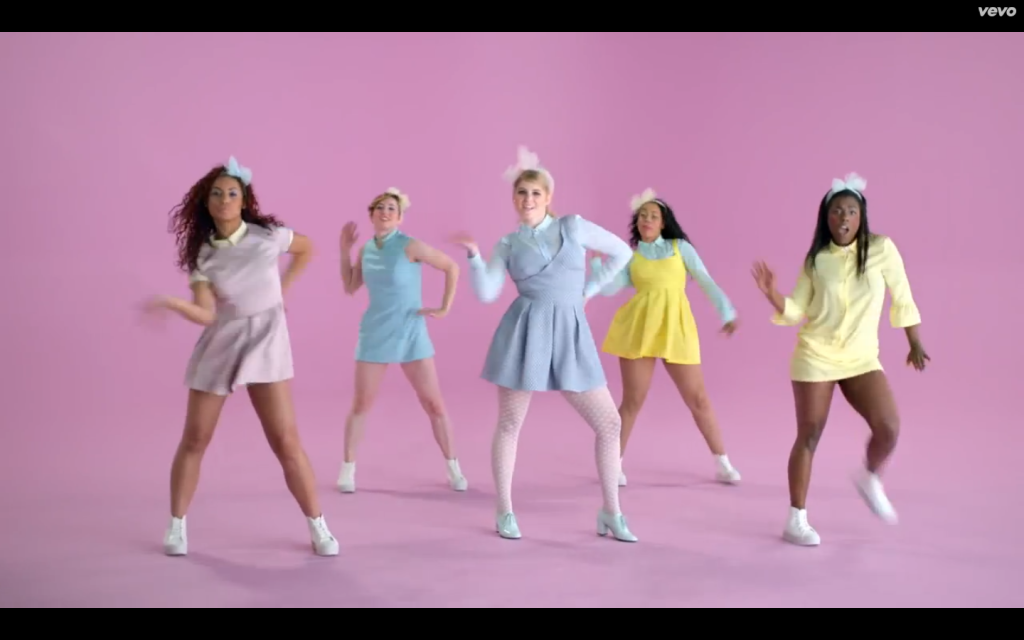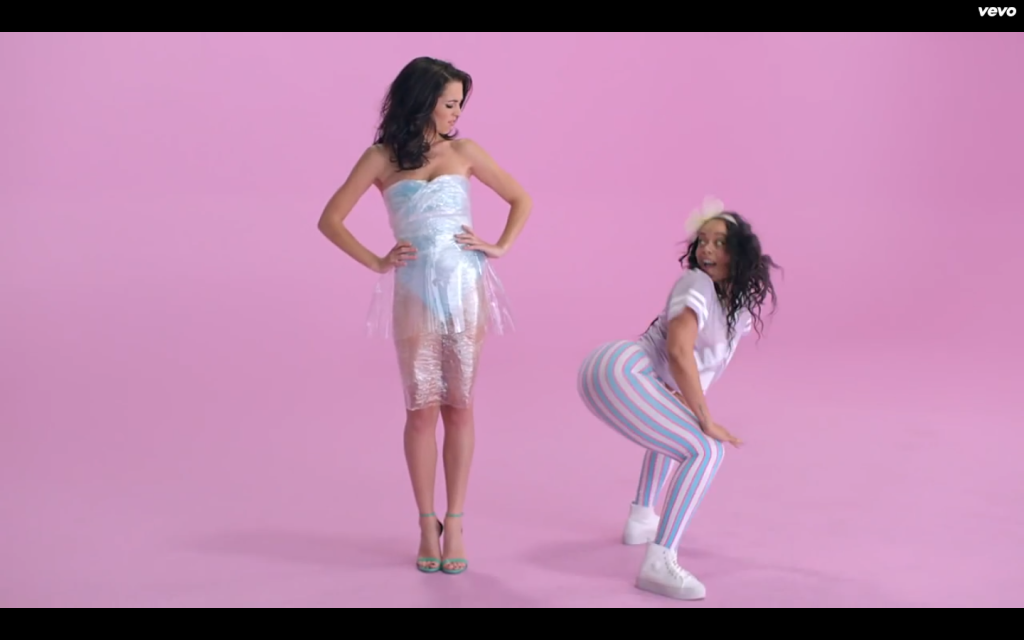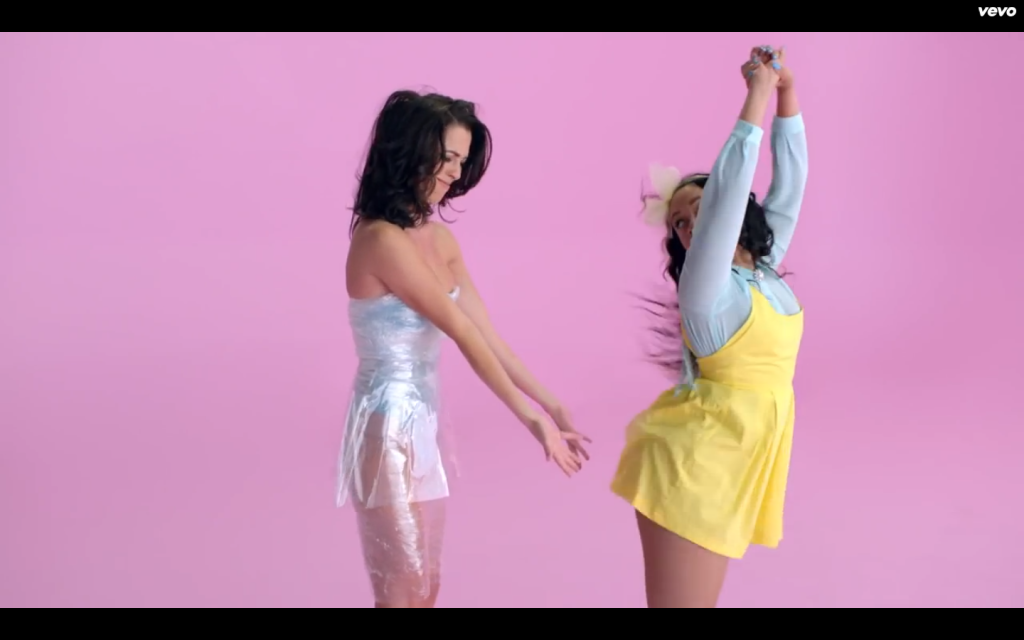Due to a recent threat I received on Facebook, I’m closing discussion here.
You’d know if you’d heard Meghan Trainor’s body acceptance anthem “All About That Bass” before. Because if you had, you’d still be hearing it right now in your head. Over. And over. And over.
Since we’ve got a lot of new visitors here lately, I’m going to restate the unofficial Trout Nation opinion* on liking problematic stuff: Just because we like something doesn’t mean it’s above reproach. We should practice turning a critical eye on the media we consume, as it gives us a chance to view our own thoughts through the lens of pop culture. This helps us learn about internalized prejudices we might otherwise have never realized we had.
(*I said “unofficial” because it’s nothing we’ve ever voted on. It just seems like a lot of people come here specifically for the dissection of pop culture. And we talk about it a lot. But we don’t have a democracy or anything. It’s a government of the people and one bewildered figurehead.)
Before we start taking this apart piece by piece, I want to warn you that the entire song is sung by a white girl using a faux African-American Vernacular accent that’s only about two levels below Iggy Azalea on the “There is no way you actually sound like that in real life”-o-meter.
So, let’s listen to this song and take a look at its accompanying video:
This thing is catchy, the girl is adorable, the video is like John Waters’s Hairspray if it hadn’t been satire and Amber Von Tussel had been nice. It’s cute and I can see why a lot of people like it. But holy shit is it problematic! Jesus and wowza. Let’s ease into this with some trivial griping before we get on with the serious stuff.
“Because you know I’m all about that bass, ’bout that bass, no treble.”
But what you are singing? Your voice right now? That’s treble. A song that was only bass wouldn’t be a very interesting song. And unless you have a really impressive range that you’re not showing off on this particular composition, you’re going to have a hard time hacking it as a singer in a world that’s all bass and no treble.
So, the lyrics begin:
“Yeah it’s pretty clear, I ain’t no size two/ but I can shake it, shake it, like I’m supposed to do.”
So, she says it’s clear that she’s not a size two:

Okay, so, yeah. Maybe not a size two. But not fat or “plus-size” by any means. Don’t let the unflattering dress trick your eye. This girl is not a fat girl. This whole concept of not-fat women believing they need to call attention to their not-fat bodies in order to promote body acceptance baffles me. I call this the “fatcceptable movement.” Notice I didn’t say “fat acceptance movement” or “body acceptance movement.” Both of those ideologies rally against the cultural standard of one perfect size at which an individual earns their humanity. The fatcceptable movement insists that there is only one type of “real” woman, and any outliers are less sexually desirable to heterosexual men, and therefore of less value.
In the fatcceptable zone, you’ll find women ranging from a US size eight to a US size fourteen talking about how big is beautiful, men don’t want sticks, real women have curves, etc. Lots of famous women have made bold statements about their size while living in the fatcceptable zone. Among them are Jennifer Lawrence, Never Been Kissed-era Drew Barrymore, and Kate Winslet before she started looking like Barbie’s hot mom (that’s a compliment, by the way). These are all women who do not fall outside of the normal range of sexually attractive bodies, but who don’t get described as skinny and who are expected to answer questions about how they feel about their “curves.” Holding women like this up as “plus-size” is meant to spread a message of body acceptance and positivity to women who aren’t the size two that Trainor throws out there, but who aren’t fat, either. To sum up, easy to digest anthems and slogans of this nature are meant to make women who think they’re fat feel good about the fat bodies they don’t have, while constantly reminding them that they should feel fat.
The lyric “but I can shake it shake it/like I’m supposed to do,” bothers me on two fronts. One, we were supposed to be shaking it this whole time? Why didn’t anyone tell me? Is this going to affect my grade? And two, people who’re a size two can’t shake it? What size is Shakira? Because she’s pretty little and she can definitely shake it.
“Cause I got that boom boom that all the boys chase/
And all the right junk in all the right places”
It’s in the right places, guys! Meghan Trainor is a fanfic Mary Sue. You heard it here first.
One of the main themes of this song is that women who are considered to be of average size are preferred by men. If this song is promoting body positivity, then why does it define a specific body type as being more desirable, and place all of a woman’s value on her fuckability to heterosexual men?
“I see the magazines workin’ that Photoshop/We know that shit ain’t real, C’mon now, make it stop/
If you got beauty beauty, just raise ’em up/
Cause every inch of you is perfect from the bottom to the top”
This verse is what “All About That Bass” could have been. Look how perfect it is. It celebrates the body of every woman and encourages them to celebrate their beauty in turn. Granted, beauty is a subjective construct that women shouldn’t have to worry about in the first place, so there is a problematic ideology that’s still inherent in these lyrics. But let’s focus on how rare it is to hear this message in pop music in the first place.
Like I said, it’s what this song could have been, because after that we’re right back to:
“Yeah, my mama she told me don’t worry about your size/She says boys like a little more booty to hold at night”
Again, the message isn’t really, “I have value, even though I don’t fit the mold I’ve been told I should fit,” but, “I have value, in fact I have more value than some other women who don’t share my body type, because I’m the one a heterosexual man should be attracted to.” And I say should be, because the next few lines say exactly that:
“You know I won’t be no stick figure silicone Barbie doll/So if that’s what you’re into then go ahead and move along”
“If you’re not a heterosexual man willing to objectify me over other women, then HA HA! I am rejecting you first.”
At what point did “body positivity” become, or need to become, yet another method to police each other’s bodies? If a woman has breast implants, that somehow lowers her worth? This is just another way in which the fatcceptable movement tries to define who is and isn’t a “real” woman. Why is it that we don’t view breast implants as body modification on the same scale as piercings or tattoos? I have this crazy feeling that it has something to do with misogyny. Maybe because the primary objective of breast implants is to conform to a specific cultural standard? How is that different from piercing your septum?
I know how it’s different. Men pierce shit, too! Plastic surgery is viewed as a way for women to make themselves more sexually desirable to heterosexual men for as far into their lives as possible. Even reconstructive plastic surgery after breast cancer fulfills this role; when performed for the patient’s personal comfort, it’s still done to uphold the standard that all women must have breasts (well hello, transmisogyny!), which is what’s making that patient uncomfortable in the first place. To be clear, I’m not shaming anyone for having any elective cosmetic surgery for any reason, just defining our world view and cultural expectations of breasts in this context.
So, with that in mind, back to the fatcceptable stance on plastic surgery: even though we’re defining your worth as a woman solely by your appeal to men, if you do anything to try to make yourself more appealing, you’re a fake ass bitch and we hate you.
Now, onto the “stick figure” portion of the chorus. This is just another shot fired at women who have bodies that threaten the self-esteem of women who can only be content about their size if it’s hailed as the “perfect” shape. That’s really what’s at the base of any “eat a sandwich” or “stick insect” barb.
“I’m bringing booty back/Go ahead and tell them skinny bitches that/No I’m just playing I know you think you’re fat/but I’m here to tell ya every inch of you is perfect from the bottom to the top”
This verse perfectly incapsulates what is wrong with this song. What could be a positive message comes out as a backhanded compliment. Sure, every inch of you is perfect from the bottom to the top, but only grudgingly. You get to feel good about yourself, but only if women Meghan Trainor’s size get to feel better by mocking your appearance. And only if you share the same weight insecurities.
And come on. Saying what you really think, followed by “just kidding,” is the most passive aggressive move on the planet. “Just playing” is like “bless your heart”: it’s a chance for the speaker to say whatever they want while forcing the target of the insult to accept what’s being said in good humor.
Now, since we’re past all the verses, I want to talk about the video. There’s a theme here:
Did you guess the theme? Did you guess “black women as props?” Because that’s the theme. Of the four back-up dancers in the video, one is white. Trainor is shown flanked by two black women several times, including a scene where the women seem to be enthusiastically encouraging her dancing, a la Miley Cyrus’s infamous “We Can’t Stop” video. This isn’t done to encourage body acceptance or equality of any kind; it’s to show the audience that Trainor is cool. White people can’t dance, right? So if black people cheer on a white girl dancing, that lends her points, right? Because the video strikingly recalls Waters’s Hairspray, I can’t help but be reminded of the line, “Being invited places by colored people! It feels so hip!” We white people love to see ourselves getting approval from black people. We just don’t want our societal standing challenged, because that makes us deeply uncomfortable.
Looking at the two bottom images, let’s discuss the role of “booty” in this song. Booty outside of the pirate context has long been used to evoke the stereotypical image of a black woman with a large, round butt. This particular racial trope has been used by white people to objectify, fetishize, and sexualize black women by our media and our white supremacist culture, then white girls apply it to themselves in a positive context. When Trainor calls attention to the size of her butt and calls it a booty, we’re supposed to laud her as being body positive and a strong feminist, but she can’t “bring booty back,” because it was never used to stereotype her to begin with.
The last picture is a perfect example of how society views the bodies of black women as available to all takers. In this scene, the white woman pictured grabs the black woman’s butt while she’s dancing. This reinforces not only the insidious cultural need of white people to control and sexualize black women’s bodies, but also the dangerous belief that the bodies of black women are on offer for anyone to sample, consent not required.
Sidebar, the fact that all of the above was going on, and the song was written in the style of 60’s pop music, a genre that was appropriated from black artists of the time and repackaged with white faces really drives home a truth that many white pop artists don’t want to admit: that white performers are only doing shallow imitations of black artists, and suppressing those black artists’ work in the hopes that no one will notice.
I know a lot of people are going to criticize me for deconstructing something that seems, on its surface, to be a positive, important statement, but as a fat woman, I’m no longer content for women who are not fat to define themselves as such to lend their defensiveness and unhappiness with their bodies credibility. As a feminist, I’m no longer content to watch women of color treated as props to further an appropriation of beauty standards that white women boast about and black women are oppressed by. If the core of your message devalues other women based on their physical appearance, you’re not promoting an ideal that helps women in the way you believe it does.


